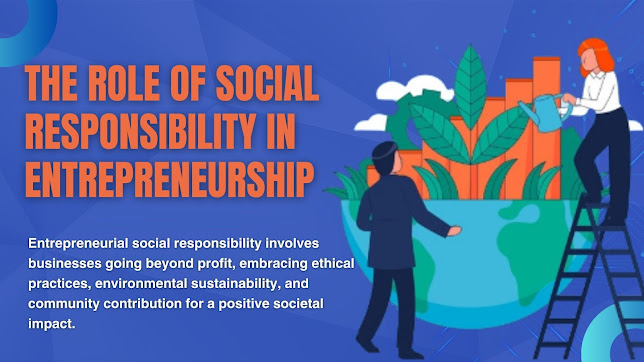The Role of Social Responsibility in Entrepreneurship
Over the 20th century, there has been a subtle shift in society's perception of business conduct. Businesses are expected to use their resources and influence to improve the quality of life around them. As Mike Sims quotes, "A business that makes nothing but money is poor. In a recent survey, 87% of customers stated they prefer businesses committed to social responsibility. In this article, we will discover the profound role of social responsibility in entrepreneurship.
Historical Perspective
Back in the day, during the industrial revolution, the economy was flourishing but problems arose—tough working conditions and harm to the environment. People started thinking, "Businesses should do better." In the early 1900s, individuals like Robert Owen and Titus Salt stepped up. They improved conditions for workers, showing that businesses could be good for their communities.
After World War II, smart thinkers like Peter Drucker said, "Businesses, think about your people and the public." In the 1960s and 1970s, we became more eco-aware. Books like Rachel Carson's "Silent Spring" and the 1970 Earth Day said, "Business, don't mess up the planet."
By the late 1900s, we coined the term "corporate social responsibility" (CSR). John Elkington's "Triple Bottom Line" in the 1990s said, "people, planet, and profit." These historical bits show how entrepreneurship and being socially responsible have been on a journey.
Key Principles of Social Responsibility
Social responsibility in entrepreneurship is a guidebook for being charitable in business. Here are the key principles that make it tick:
Environmental Sustainability: Entrepreneurs engage in eco-friendly practices, like reducing their carbon footprint. They want their business to help, not hurt, the Earth.
Ethical Business Practices: This one's about being the good guy. Entrepreneurs go for fair trade, making sure their supply chains are clean and steering clear of anything shady.
Community Engagement: Entrepreneurs jump into local communities, support local projects, and make their neighborhoods better. It's all about giving back to the place they call home.
Employee Well-Being: Happy employees make a happy business. Entrepreneurs care about their teams. They make sure work and life are balanced, promote diversity, and foster a workplace where everyone feels important. Because a business is only as awesome as its people.
Benefits and Challenges
When entrepreneurs decide to be socially responsible, they get some appealing rewards but also face a few tricky moments along the way.
A. Advantages of Social Responsibility for Entrepreneurs
Enhanced Brand Reputation: People want to collaborate with you. Entrepreneurs doing good stuff build trust and love from customers, making their brand shine.
Attraction of Ethical Consumers: Entrepreneurs into social responsibility pull in customers who care about ethics, creating a fanbase of loyal, do-gooder customers.
Positive Impact on Employee Morale: Happy employees make the workplace fantastic. Entrepreneurs who care about social responsibility boost their team's spirits.
B. Challenges in Implementing Social Responsibility
Financial Constraints: Sometimes, doing good things costs money. Mike Sims points out that entrepreneurs might face challenges figuring out how to squeeze socially responsible actions into their budget.
Balancing Profitability and Social Impact: Making money while doing good isn't always a smooth ride. Entrepreneurs have to walk a fine line, making sure they're profitable while still spreading good vibes.
Tools and Strategies for Implementation
Alright, so you want to dive into social responsibility in your business? Good call! Here are some handy tools and strategies to make it happen:
Incorporating Social Responsibility into Business Plans: Start from the beginning. Make social responsibility part of your business plan.
Metrics for Measuring Social Impact: Numbers speak volumes. Use metrics to track how your business is making a difference. Instead of points, you're counting the positive impact on people and the planet.
Employee Training Programs: Get your team on board. Train them on social responsibility. They'll know how to make a positive impact while doing their job.
Supplier Audits for Ethical Practices: Check with your partners. Make sure your suppliers are playing fair. It makes sure everyone in your business squad is on the same ethical page.
Stakeholder Collaboration Platforms: Team up with others. Use platforms where stakeholders, like customers and communities, can share ideas.
Government and Regulatory Influence
When it comes to social responsibility in business, the government plays a big role. Let's break down how government and regulations shape the game of social responsibility.
Role of Policies in Promoting Social Responsibility: The government sets the rules. Policies tell businesses, "Hey, be good to people and the planet." It's like having a how-to-be-nice manual.
Collaboration Between Entrepreneurs and Regulators: Entrepreneurs and rule-makers team up. They work together to make sure businesses are contributing positively and not causing trouble.
Compliance with Standards: There's a checklist. Businesses need to meet certain standards. It makes sure everyone is playing by the same fair rules.
Incentives for Socially Responsible Practices: The government says, "You do good things; we'll give you a little bonus." It's like getting a gold star for being awesome.
Enforcement of Ethical Guidelines: No cheating is allowed. Regulators should keep an eye out. If a business isn't being nice, there are consequences.
Closing Remarks
In wrapping it up, social responsibility isn't just a buzzword; it's the key to success for businesses. Mike Sims came to the conclusion that it improves your brand, makes employees happy, and has a positive impact on the world. So, why not dive in? Entrepreneurs, it's time to embrace social responsibility. Be the business that not only succeeds but also makes a difference. It's a win-win for everyone—your company, your team, and the communities you touch.


.jpg)
Comments
Post a Comment